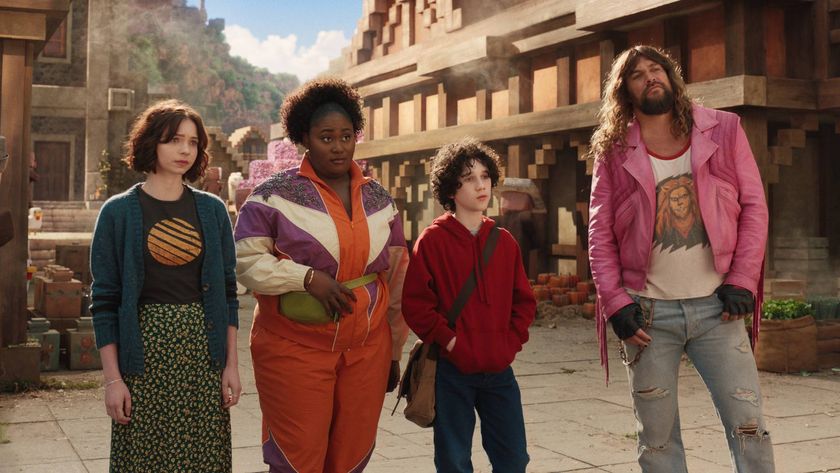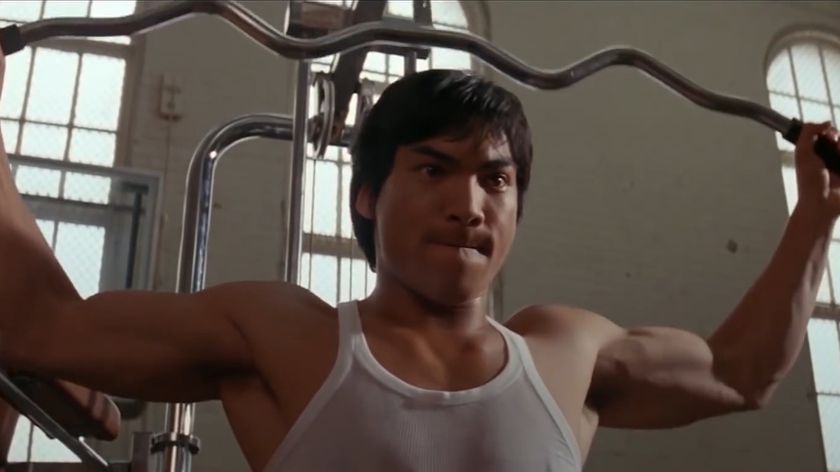Movies to watch this week at the cinema: All the Money in the World, Brad's Status, and more

Out on Friday January 5
Ridley Scott steers an ideas-rich, character-based thriller. Aaron Sorkin takes on poker for his dizzying directorial debut. Ben Stiller leads a perceptive portrait of fortysomething angst.
Yes, here's this week's new releases. Click on for our reviews of All the Money in the World, Molly’s Game, Brad’s Status, Hostiles, Jupiter’s Moon, Renegades, Walk with Me, Glory, Persona, and Rey.
For the best movie reviews, subscribe to Total Film.

All the Money in the World
Ridley Scott’s latest has its work cut out convincing audiences to look beyond its Kevin Spacey-shaped backstory. But when did Scott ever shirk a challenge? In a career of many post-slump comebacks, Scott rebounds from Alien Covenant and actor crises with a terse, tense, true-life period kidnap thriller loaded up on ideas: most of which, as in his best work, resonate without distracting from its story or stars.
On which note, enter Christopher Plummer to replace the disgraced Spacey. Summoning judicious hints of humanity without softening his character, Plummer banks a niftily nuanced turn on any terms as bristly billionaire J Paul Getty. And on the terms of his nine-day shoot, cough up the superlatives – Plummer owns the role spectacularly.
Happily, Scott’s film earns him. Drawing on John Pearson’s book Painfully Rich, David Scarpa’s (2008’s The Day the Earth Stood Still) fluent script spotlights the kidnapping of Getty’s 16-year-old grandson Paul III (Charlie Plummer) in Italy, 1973. When tight-purse gramps refuses to pay the $17m ransom, Paul’s mum Gail (Michelle Williams) and ex-CIA operative Fletcher Chace (Mark Wahlberg) are left to liaise with abductor Cinquanta (Romain Duris) or “find the boy”.
Scott makes focused work of a multi-stranded story, breezing through Getty’s early years while ferrying us from the Fellini-ish black-and-white lustre of a Rome-set opening to Saudi Arabia, Southern Italy, San Francisco and Brit toff-piles. DoP Dariusz Wolski’s images smooth the way, contrasting Getty’s world, Gail’s home-life bustle, pap-packed streets and Paul’s rough-hewn confinement without labouring the style.
The character line-up is equally well-navigated by the leads, only Wahlberg looking awkward in the period setting. Tapping Ripley-esque reserves of trauma-lashed tenacity, Williams brings fuss-free conviction to a woman caught between villains: the kidnappers and Getty, whose ideas about family land like ominous Mafia wisdoms. Meanwhile, Duris and Charlie mount delicate balancing acts between Stockholm syndrome and something warmer.
Even before a view of the Colosseum recalls Gladiator and an amputation echoes Alien’s ouch factor, there’s a sure-handed balance of subtexts and story that invokes prime-form Scott. While a surgical atrocity amplifies the story stakes, so does the idea that a hunger for wealth gorges on itself, leaving the rich so self-consumed they might as well be “from another planet”.
These ideas reverberate without reducing tension, which Scott stokes terrifically for a multi-viewpoint race against mounting odds to rescue Paul. Though some climactic set-pieces trade facts for grandeur, All the Money… remains indisputably impressive as its own rescue operation against sizeable odds.
If you knew nothing of its astounding #metoo-era intervention, you wouldn’t notice: you’d just have a lean, intelligent, layered thriller from an on-form Scott and a magnetic lead. And that’s surely worth the asking price.
THE VERDICT: His actor issues resolved remarkably, Scott steers his ideas-rich, character-based thriller with brisk authority. Plummer and Williams bring their all.
Director: Ridley Scott; Starring: Mark Wahlberg, Michelle Williams, Christopher Plummer; Theatrical release: January 5, 2018
Kevin Harley

Molly’s Game
There are two poker terms you need to know before you even begin to get your head around Aaron Sorkin’s dizzying directorial debut: ‘the fish’ and ‘the nuts’. A ‘fish’ is a not-up-to-snuff player prone to gambling big and losing. ‘The nuts’ is the best possible hand from the cards available.
Sorkin’s whizzy, Oscar-snaffling scripts have previously been wrestled to the screen by the likes of Danny Boyle (2015’s Steve Jobs), David Fincher (2010’s The Social Network) and Rob Reiner (1992’s A Few Good Men), rather well as it happens. In such hallowed company, he’d be forgiven for looking a little bit Aquaman.
Based on Molly Bloom’s memoir Molly’s Game, with its exuberant subtitle – ‘From Hollywood’s Elite to Wall Street’s Billionaire Boys Club, My High-Stakes Adventure in the World of Underground Poker’ – the film begins with Molly (Jessica Chastain) about to dash her Olympic hopes, and more besides, in a career-ending ski jump. She’s not the only one who needs to brace herself.
In a characteristically intimidating info-dump, this opening sequence introduces: Molly’s ceaseless determination; her tough-love relationship with her demanding dad (Kevin Costner), a clinical psychologist and her coach; even an ancient injury. “When I was 12 years old, for no particular reason, my back exploded,” she says in voiceover. No matter, however, as she admits, “None of this has anything to do with poker.”
As a statement of intent, it’s a tour-de-force: feisty, funny and packed with telling details. Olympic hopefuls, Molly explains, consider coming in fourth place to be the worst thing that can happen. Once we’ve seen her survive that ferocious spill, she offers the rather pithier summary, “Fourth place, seriously? Fuck you!”
A lot can happen in two minutes in Sorkin-land, and there’s barely time to draw breath before we’re watching the grown-up Molly being raided by the FBI. The narrative then whips back and forth to establish exactly why, building a multi-layered picture of our gutsy, gung-ho, heroine.
In the present, Molly awaits trial with her exasperated lawyer, Charlie Jaffey (Idris Elba), for her alleged Mob connections, though she steadfastly refuses to name names. In the past, we watch young Molly leave skiing behind, move to LA and get a job as office assistant to Jeremy Strong’s dickish Dean (sample dialogue, “Move your fucking ass”).
Soon she’s hosting clandestine high-stakes poker games for him in the back room of a bar, and taking home $3,000 per night in tip money. “I googled every word I didn’t know,” she tells us. Viewers might need to do the same.
After some sneaky double-dealing by Dean’s star player (Michael Cera), Molly is forced out and moves to New York, where her reputation, and troubles, grow. She hires a suite at a swanky hotel and proceeds to set up her own game in “the world’s most exclusive and decadent man cave”.
Ever the pragmatist, she consults a lawyer about the dubious legality of the enterprise (“This was back when I still made good decisions,” she admits), whose advice, “Don’t break the law when you’re breaking the law,” proves easier said than done. Soon the game starts attracting Russian mobsters, Mafia heavies, even a gallery bod happy to leave a Monet painting as his stake, and Molly turns into the she-wolf of Wall Street, pharmaceuticals and all.
Fighting for a woman who could, but won’t, defend herself, Elba – always better with an American accent – makes a powerful, dignified foil. But we’re many miles from dry courtroom drama. When the FBI insists it has phone evidence of mobsters asking for Molly by name, Charlie points out that might actually mean MDMA (aka “Molly”).
In the New York sequences, meanwhile, O’Dowd brings proper LOLs as a drunken suitor whose slurred digressions sound “like the title of a detective novel”. “Victim of circumstance,” he begins, but the key to Molly’s character is how she refuses to be a victim of hers.
Featuring witty switchbacks, montages within montages and plenty of shouty Sorkin power-plays, it’s a whirlwind watch. But it’s only when we witness one poor sap (Bill Camp from The Night Of) lose everything – while Molly tries to stop him – that the breathless, Teflon style reveals its heart. Bloom’s an extraordinary character, expertly played, and we gradually move from admiring her chutzpah to genuinely caring what happens to her.
Some of the musical cues feel a little canned, and there’s a father-daughter rapprochement that skirts the cheese counter, but otherwise Sorkin delivers on all fronts, swiftly dispelling any accusations of fishiness. On this basis, he’s the nuts.
THE VERDICT: Pure class. Chastain and Elba deserve Oscar noms, and Sorkin’s second Best Adapted Screenplay award (after The Social Network) is a sure thing.
Director: Aaron Sorkin; Starring: Jessica Chastian, Idris Elba, Kevin Costner, Michael Cera; Theatrical release: January 1, 2018
Matt Glasby

Brad’s Status
Ben Stiller’s run of midlife-crisis films (Greenberg, While We’re Young, The Secret Life of Walter Mitty) continues with this mordantly witty drama about a 47-year-old suburbanite who can’t resist measuring himself against his more successful college contemporaries.
Brad Sloan (Stiller) has a loving wife (Jenna Fischer), a rewarding career and a gifted teenage son. But as he and Troy (Austin Abrams) embark on a tour of East Coast campuses, his latent inferiority complex gets the better of him, compelling him to reconnect with former friends to see how he compares.
Writer/director Mike White has fun depicting these objects of Brad’s envy – Michael Sheen’s political pundit, Luke Wilson’s hedge-fund manager and so on – as both the odious extroverts Brad imagines them to be and the more complicated individuals they actually are. What’s less fun, alas, is Brad himself, played by Stiller as a joyless grump who’s not quite as interesting to be around as White makes out.
Fortunately, he’s offset by Abrams, an endearingly gauche presence as the Yin to Stiller’s Yang. His performance is a welcome balm in a film that, like Ingrid Goes West, shows how the curated lives we’re shown on social media can fuel toxic resentment.
THE VERDICT: We’ve seen Stiller do ‘exasperated malcontent’ before, but this remains a perceptive portrait of fortysomething angst.
Director: Mike White; Starring: Ben Stiller, Austin Abrams, Jenna Fischer; Theatrical release: January 5, 2018
Neil Smith

Hostiles
Delivering his fourth movie in eight years, Scott Cooper is quietly becoming one of America’s most compelling directors. It’s no surprise that Christian Bale has been drawn to him twice, first starring in his 2013 Rust Belt sibling drama Out of the Furnace and now in this slow-burning but handsomely wrought western that, like Cooper’s previous work, examines innate violence in the American psyche.
Set in 1892, Hostiles casts Bale as Captain Joseph J. Blocker, a soon-to-retire US cavalry officer ordered to escort a dying Cheyenne, Chief Yellow Hawk (Wes Studi), from Arizona to his Montana homeland, the Valley of the Bears. After fighting in the American Indian Wars, Blocker treats his charge with deep suspicion – hardly alleviated when his party encounters Rosalie Quaid (Rosamund Pike), a woman who saw her whole family slaughtered by Comanches.
Based on an unproduced screenplay by the late Donald Stewart, Hostiles oozes class, from the downbeat Max Richter score to the rigorous support – including Rory Cochrane and Jesse Plemons, co-stars from Cooper’s gangster saga Black Mass. With Bale speaking lines in Cheyenne (he even reunites with Q’orianka Kilcher, from Terrence Malick’s The New World), it’s a film that embraces the Wild West in all its complexity, savagery and prejudice.
THE VERDICT: Cooper’s western may be too meditative for some, but its grit, beauty and honesty are too potent to ignore.
Director: Scott Cooper; Starring: Christian Bale, Rosamund Pike, Ben Foster; Theatrical release: January 5, 2018
James Mottram

Jupiter’s Moon
Shot by a cop, Syrian refugee Aryan (Zsombor Jéger) develops levitation powers in Kornél Mundruczó’s ambitious, energetic, but over-determined follow-up to canine fable White God. Is it a superhero riff, a religious allegory, a political parable?
The sheer volume of potential readings eventually stalls on reductive soundbites about a faithless generation, but the set-pieces sizzle with style.
Director: Kornél Mundruczó; Starring: Merab Ninidze, Zsombor Jéger, György Cserhalmi; Theatrical release: January 5, 2018
Kevin Harley

Renegades
There’s Nazi gold in them there hills – well, actually at the bottom of a Bosnian lake – in this murky Luc Besson-scripted thriller. Enticed by Sylvia Hoeks’ local, a group of Navy Seals deep dive, promising her half of the $300m booty to help her wartorn people.
Largely gung-ho nonsense, but it’s always a pleasure to see J.K. Simmons in ball-busting mode, barking words like “simpletons!” at his men.
Director: Steven Quale; Starring: J.K. Simmons, Charlie Bewley, Sullivan Stapleton; Theatrical release: January 5, 2018
James Mottram

Walk with Me
In 1966, Zen Buddhist master Thich Nhat Hanh was exiled from Vietnam, later settling in France where he established a world-leading centre for mindfulness. Marc J. Francis and Max Pugh’s glacially paced doc contemplates his work and philosophy, stylistically imitating meditation but lacking analysis.
The result is poetic but unfocused, with Benedict Cumberbatch providing sparse narration.
Directors: Marc J. Francis, Max Pugh; Starring: Benedict Cumberbatch, Thich Nhát Hanh; Theatrical release: January 5, 2018
Tim Coleman

Glory
Writer/directors Kristina Grozeva and Petar Valchanov follow up impressive debut The Lesson (2014) with this darkly comic parable of injustice in modern Bulgaria.
It brings together a stuttering provincial railway labourer (Stefan Denolyubov) and a government PR fixer (Margita Gosheva), who cynically exploits the former’s honesty. Shot with doc-style immediacy, it expertly builds to a shocking climax.
Directors: Kristina Grozeva, Petar Valchanov; Starring: Stefan Denolyubov, Margita Gosheva, Ana Bratoeva; Theatrical release: January 5, 2018
Tom Dawson

Persona
The Seventh Seal (1957) is Ingmar Bergman’s best-known film; Persona (1966) is simply his best, charting the relationship between a chatterbox nurse (Bibi Andersson) and a mentally ill actress (Liv Ullmann) who’s retreated into silence.
It explores two of the filmmaker’s pet themes – the impossibility of true communication, the futility of art – and is set against the Vietnam War. Extraordinary.
Director: Ingmar Bergman; Starring: Bibi Andersson, Liv Ullmann, Margaretha Krook; Theatrical release: January 1, 2018
Jamie Graham

Rey
By turns poetic and baffling, director Niles Atallah’s film is as audacious as its subject – a real-life 19th Century lawyer named Orélie-Antoine de Tounens who travelled to Patagonia and declared himself king.
Incorporating masks, animation and archive scenes, Atallah underscores the idea of unreliable memory within this sketchy historical account. Often pretentious, but undeniably impressive.
Director: Niles Atallah; Starring: Rodrigo Lisboa, Claudio Riveros; Theatrical release: January 5, 2018
Matt Looker
The Total Film team are made up of the finest minds in all of film journalism. They are: Editor Jane Crowther, Deputy Editor Matt Maytum, Reviews Ed Matthew Leyland, News Editor Jordan Farley, and Online Editor Emily Murray. Expect exclusive news, reviews, features, and more from the team behind the smarter movie magazine.

Dan Da Dan and Solo Leveling lead the list of Anime of the Year nominees in the 2025 Crunchyroll Anime Awards

Fantastic Four: The First Steps director unveils the movie's retro-futuristic space suits and practical sets: "I really wanted it to feel like it was made in 1965, the way Stanley Kubrick would have made it"

Dan Da Dan and Solo Leveling lead the list of Anime of the Year nominees in the 2025 Crunchyroll Anime Awards

Fantastic Four: The First Steps director unveils the movie's retro-futuristic space suits and practical sets: "I really wanted it to feel like it was made in 1965, the way Stanley Kubrick would have made it"











